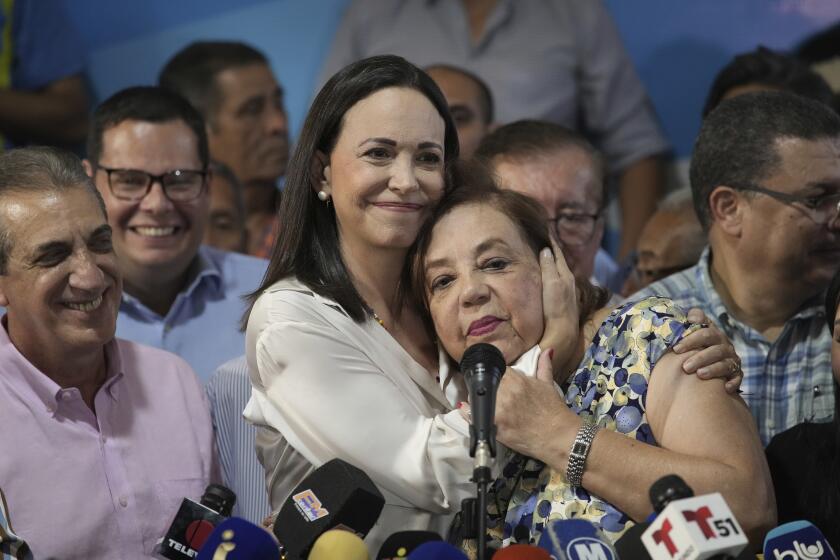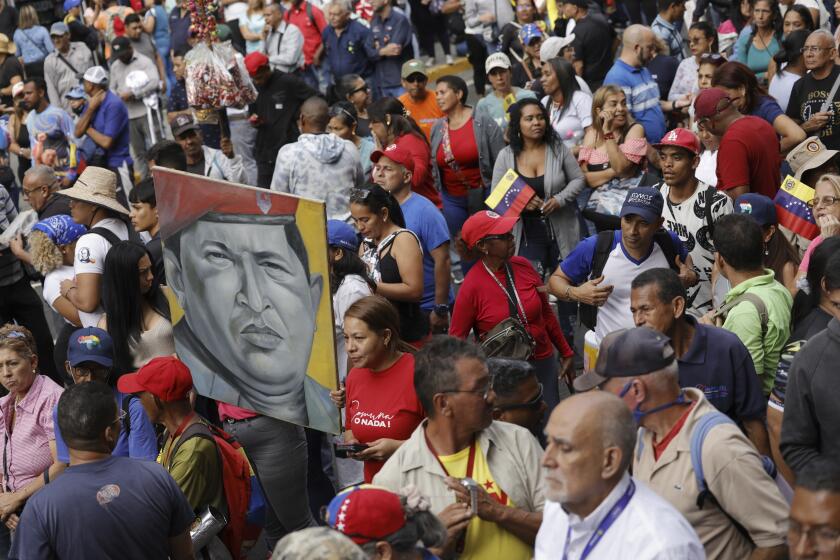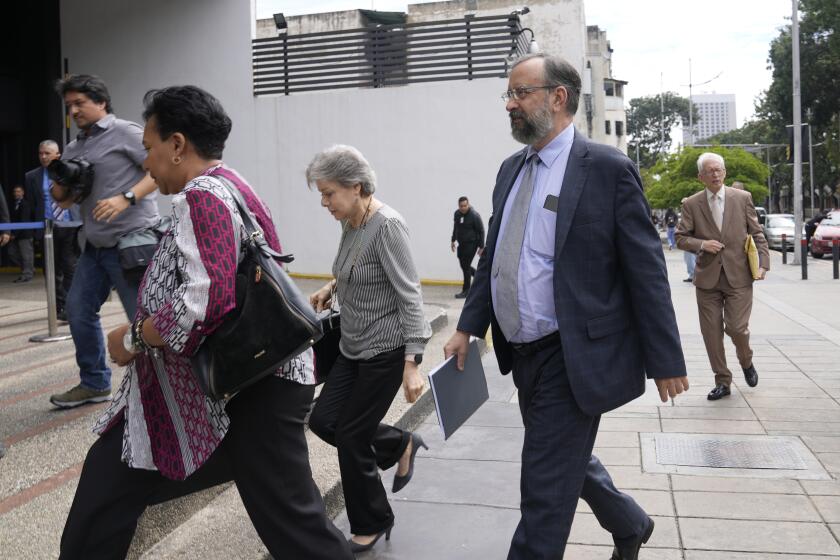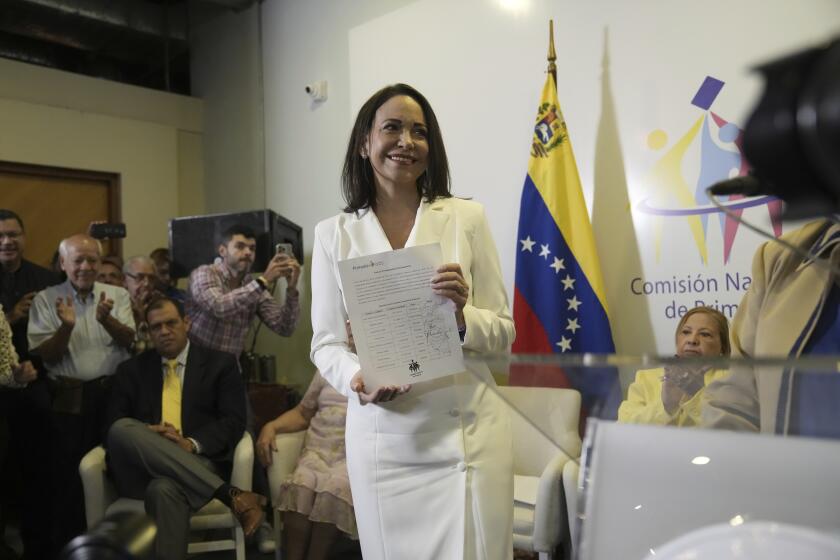Venezuela’s Maduro makes official reelection run as rival struggles
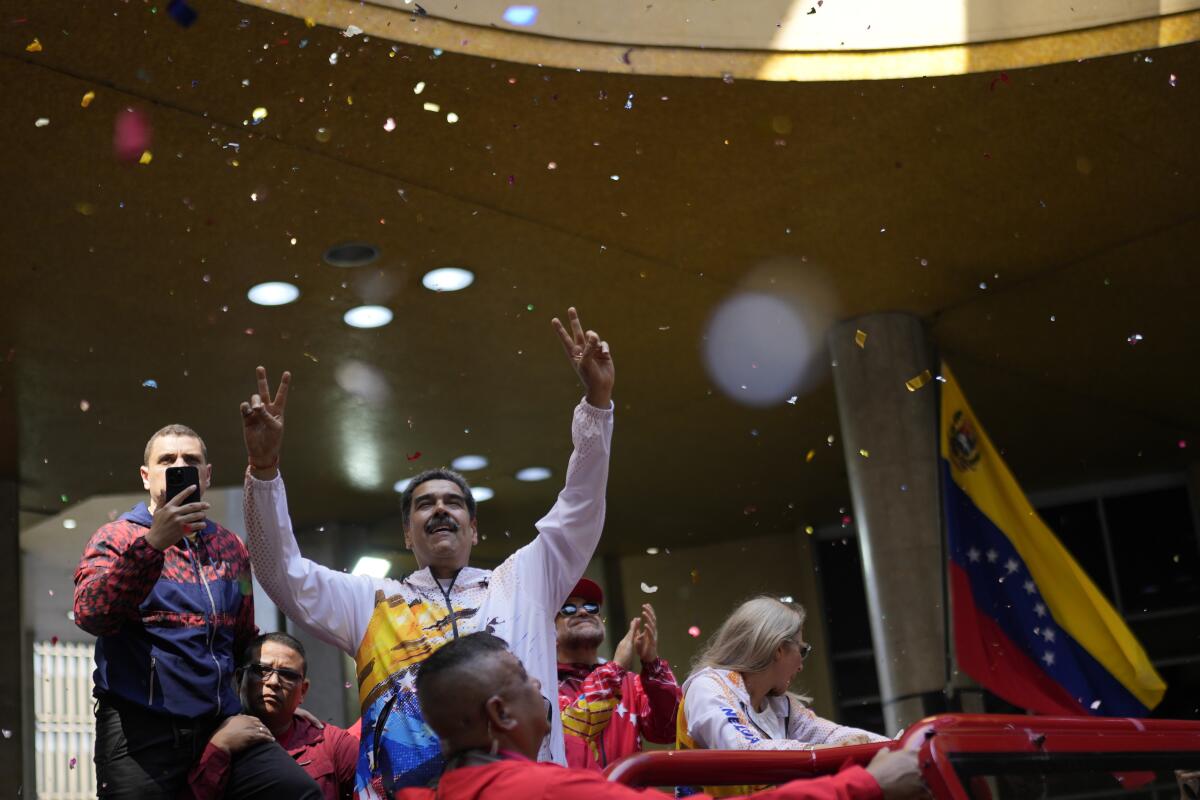
CARACAS, Venezuela — It’s a tale of two dramatically different political campaigns.
On Monday, throngs of supporters of President Nicolás Maduro rallied at a giant stage draped in the red, yellow and blue of Venezuela’s flag outside the electoral council headquarters where he made official his candidacy for a third term lasting until 2031. Meanwhile, his would-be rivals tried to register their candidate, an 80-year-old newcomer, before a looming deadline but found they were unable to do so — in what the opposition denounced as the latest attack on Venezuela’s democracy.
Polls show that Venezuelans would reject the unpopular Maduro by a landslide if given a chance.
But he has so far managed to block his chief opponents from running while alternately negotiating and then reneging on minimal electoral guarantees promised to the U.S. government in exchange for relief from oil sanctions.
In a creative attempt to force Maduro’s authoritarian hand, two smaller opposition parties previously authorized to participate in July’s tightly managed election nominated former academic Corina Yoris last week.
Venezuelan opposition powerhouse María Corina Machado has named a substitute to her presidential bid while she fights a government ban on her running for office against Maduro.
The protest candidacy took friends and foes alike by surprise. An academic who has taught logic and philosophy at several Venezuelan universities, she’s barely known even in opposition circles. Her only public political role until now was as a member of the committee that organized last year’s opposition primary in which 2.4 million voters in Venezuela and abroad defied government threats of criminal prosecution to select a candidate to run against Maduro.
But her relative anonymity, squeaky clean record and affectionate grandmotherly air have fast become part of her appeal. Even her name — Corina — is viewed as an asset, a not so subtle reminder of her namesake ally, Maria Corina Machado, whose candidacy was outlawed by the Maduro-stacked Supreme Court after she won October’s primary by an overwhelming majority.
“We’ve exhausted all of the possibilities,” Yoris said at a news conference Monday in which she detailed her failed attempts to register, both electronically and in person, her candidacy. “It’s not just the name of Corina Yoris that is being denied but the name of any citizen that wants to run.”
In registering his own candidacy Monday, Maduro, without mentioning Yoris by name, blasted his would-be rival as a “puppet” of traditional elites.
Dueling political factions are demonstrating on the streets of Venezuela’s capital, Caracas.
He cast his own reelection bid in historic terms, saying it was the continuation of the Bolivarian revolution launched a quarter-century ago by the late Hugo Chavez and the only way to protect Venezuela’s sovereignty amid attempts by the U.S. “empire” to dig its “claws” into the OPEC nation’s oil wealth.
“I can only say, with humility, that I am made of the same muddy earth as you,” he said in the televised address at the National Electoral Council.
To date, 10 candidates have registered to compete in the July elections, none of them connected to the main opposition coalition and several seen as representing little threat to Maduro’s power base. Once parties register their candidate, they have until April 16 to name a substitute.
Maduro’s supporters have wasted little time in targeting Corina ever since she was tapped to lead the opposition’s electoral fight.
Over the weekend, several members of the ruling Socialist Party took to social media to claim Yoris was a citizen of Uruguay, making her ineligible to run due to a requirement in Venezuela’s constitution that the president be a natural-born citizen without dual nationality.
Venezuela’s high court ordered organizers to hand over all ballots and tally sheets, saying the independent contest may be in violation of the law.
On Monday, Yoris dismissed such talk as a desperate ploy to disqualify her candidacy.
“I was born in Caracas, my parents were born in Venezuela, and I’ve never opted for any other nationality,” she said.
Venezuela’s election is taking place against the backdrop of a swelling crackdown on dissent aimed at ensuring Maduro remains in power.
But rather than boycott the vote, as it did when Maduro was reelected to a second six-year term in 2018, the opposition is seeking to call Maduro’s bluff and force him to outright steal the vote.
The strategy appears to have the full support of the administration of President Biden, which has so far been in no rush to reimpose oil sanctions eased last year in response to an agreement on electoral guarantees struck in Barbados by Maduro and the opposition.
Venezuelan government critic María Corina Machado has been declared the winner of an opposition-organized primary to choose a presidential candidate.
While some of the pledges have been partially fulfilled, others, such as the right of each political movement to freely select its candidates, have been all but ignored, calling into question the wisdom of a hands-off approach that so far has only emboldened Maduro.
“Maduro and his criminal enablers could learn something about patriotism, sacrifice, and love of country from the Venezuelan opposition,” Sen. Richard J. Durbin (D-Ill.), the majority whip, said in a message posted on X over the weekend. “Their candidates must be allowed to register by Monday or sanctions relief must be halted.”
Geoff Ramsey, a senior analyst on Venezuela at the Atlantic Council in Washington, said the Biden administration is in a difficult position of trying to retain some leverage with Maduro while quieting skeptics who think it is being too lenient with Caracas.
“The U.S. will almost certainly have to snap back some sanctions, but there are ways to do so while still keeping the regime at the table,” he said. “But if Machado and the wider opposition aren’t even able to register a candidate, the president’s hands will be tied.”
Goodman and Rueda write for the Associated Press. Goodman reported from Miami.
More to Read
Sign up for Essential California
The most important California stories and recommendations in your inbox every morning.
You may occasionally receive promotional content from the Los Angeles Times.
